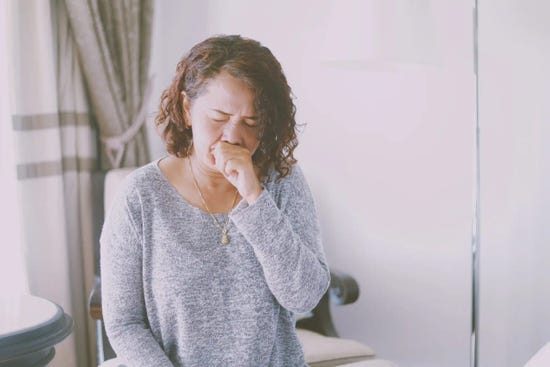Sore Throat Symptoms & Causes
Are you wondering what might be the cause of your painful sore throat? Read about sore throat symptoms, causes and how..

We encourage you to practice good hygiene and physical distancing to help slow the spread of germs. If you are experiencing symptoms of fever, coughing, sore throat or shortness of breath, you should seek medical advice from a doctor (including pathology testing) and stay at home. Where any conflict may arise between the Department of Health’s advice and any information on this website, please follow advice from the Department of Health’s health alerts.
What is a sore throat?
To better understand a sore throat, it can help to know what the different parts of your throat are. Your throat, also called the pharynx, sits in the back of your mouth. It connects the sinuses in your nose to the top of your windpipe, called the trachea, and your food pipe, called the oesophagus. The tonsils and voice box, or larynx, are also part of your throat.
A sore throat describes irritation or pain that affects one or all parts of your throat. And because this pain is usually caused by inflammation, a sore throat is often called pharyngitis (inflammation of the pharynx), laryngitis (inflammation of the larynx), or tonsillitis (inflammation of the tonsils), depending which part of your throat is affected.
Causes of sore throat
Are you wondering what causes a sore throat? While most cases of sore throat are caused by an infection, they can also be a symptom of a range of other conditions. Here we’ll review some of the more common sore throat causes.
Cold and flu
Viral infections are responsible for most sore throats, causing 70% to 95% of all throat infections in adults and children.1 Viruses that cause respiratory infections such as the common cold and the flu are the most likely culprits. A dry, scratchy, irritated sore throat is often one of the first signs of a cold and may develop into more serious throat pain.
Bacterial infections
A sore throat can also be caused by different types of bacterial infections. The most common type of bacteria that causes throat infections is responsible for up to 30% of throat infections in children and around 10% in adults.2-4
Allergies
One of the most common non-infectious causes of a sore throat is seasonal allergies that cause inflammation of the nasal passages, often called allergic rhinitis or rhinosinusitis. This inflammation can cause your nasal passages to swell and become congested, as well as causing increased mucus production that can drip down the back of your throat – a phenomenon called postnasal drip. Allergy-induced nasal congestion and postnasal drip can both cause a sore throat.
Air quality
Environmental triggers are another common non-infectious cause of sore throat. These include smoking or exposure to second-hand smoke or pollution in the air. Even just changes in the season or weather that result in exposure to cold or dry air can trigger a sore throat.
Gastro-oesophageal reflux
While gastro-oesophageal reflux is most often associated with symptoms of heartburn and indigestion, it can also cause an irritated, sore throat. Reflux-related sore throat can result from direct irritation when the acidic contents of your stomach enter your throat, or from ongoing coughing caused by the reflux.
Sore throat symptoms
A sore throat may feel different depending on the cause, ranging from a dry, scratchy, or tickly irritation all the way to a burning, swollen throat that causes pain when swallowing.5 Other symptoms often accompany your sore throat, depending on the underlying cause.
Pain or discomfort that gets worse when swallowing is a typical sore throat symptom when you have a throat infection.2,3 The inside of your throat will often look swollen and red – two key signs of inflammation.6 For respiratory viral infections, a sore throat will usually be accompanied by cold and flu symptoms such as a runny nose, nasal congestion, cough, and fever.3,7 With bacterial infections, as well as some other viral infections, a painful sore throat may be accompanied by high fever, sore swollen glands, and tonsils that leak pus or fluid (tonsillar exudate).2,3,7
Sore throats related to environmental triggers such as air quality are often described as dry, tickly, or irritated rather than causing outright pain when swallowing.5
Sore throats caused by seasonal allergies will often occur with symptoms of nasal congestion such as sneezing, runny nose, watery eyes, or sinus pain, and may be worse in the morning or at night.2
Finally, reflux-related throat irritation typically worsens after eating, and you may experience the feeling of a lump in the throat, the need to frequently clear your throat, or some hoarseness.2
Throat pain diagnosis
Because throat pain can result from many different conditions, it’s important to see your doctor to get a formal diagnosis if you’re worried. Your doctor will base their diagnosis on a description of your symptoms (including location, duration, and timing of throat pain, plus any accompanying symptoms) and an examination of your throat. Depending on your symptoms, your doctor may take a swab of your throat and/or nose to test for bacterial or certain viral infections.
When should you worry about a sore throat?
Most sore throats are caused by self-limiting viral and bacterial infections – that means they will usually resolve on their own in about a week. However, you should see your doctor if you have any concerns about your sore throat or other symptoms, or if you experience any of the following:3,7
⦁ Symptoms that worsen or do not improve within 3 to 7 days, especially fever.
⦁ New symptoms
⦁ Dehydration
⦁ Severe throat or neck pain or stiffness
⦁ Difficulty breathing
⦁ Drooling
⦁ Muffled voice or hoarseness
Treating a sore throat at home
Now that you know all about how to get a sore throat, what about how to relieve it? Sore throats associated with self-limiting infections such as colds and flu can usually be managed by treating your symptoms to help you feel better. This can include food- and drink-based home remedies that help to soothe your throat pain.
Staying hydrated
While you may try to avoid eating or drinking when you have a sore throat because of pain or difficulty when swallowing, it’s important to stay hydrated while you are recovering. To help prevent dehydration, drink adequate amounts of fluids, which can be warmed or cooled to reduce irritation to your sore throat.
Warm liquids
Sipping warm drinks such as tea or water with honey and lemon can help provide relief from throat pain. Gargling or rinsing out your mouth with warm salty water may also help relieve a little.
Cold foods
Sucking on cold foods such as ice cubes or ice blocks can numb your throat and make swallowing less painful while also helping keep you hydrated. Eating some ice cream can also soothe throat pain while providing some energy.
Soft foods
When you have a sore throat, warm and soft foods are often less irritating and easier to swallow than room temperature or rough-textured foods. Also consider foods that coat the throat, such as honey or lozenges, to help relieve throat pain.
Sore throat treatments
As well as adjusting your food and drinks, there are some helpful medications that you can try to help relieve your sore throat symptoms.
Medication for sore throat
To help relieve pain and reduce any fever associated with a sore throat, consider taking an over-the-counter pain reliever such as paracetamol or a nonsteroidal anti-inflammatory drug (NSAID).
When you are looking for a medication for sore throat that offers fast relief, try medicated lozenges or sprays. Look for something that contains antiseptic ingredients to help kill the germs that can cause throat infections, or an anaesthetic ingredient to help numb the throat, or an anti-inflammatory ingredient to reduce throat inflammation.
Strepsils® offers a range of sore throat medications to help relieve your sore throat:
⦁ Strepsils Lozenges have double antiseptic action for fast and effective relief from throat discomfort. Available in a range of flavours.
⦁ Strepsils Max Triple Action Lozenges have antiseptic and anaesthetic action to provide rapid relief from painful inflamed sore throats.
⦁ Strepsils Chesty Cough Lozenges provides dual relief – clears airways & relieves chesty coughs by dissolving mucus.
Antibiotics
Antibiotics are not needed for treating most sore throats, because antibiotics offer no benefit for infections caused by viruses and do not relieve throat pain. A doctor may consider prescribing antibiotics for a confirmed bacterial throat infection in certain situations but will carefully weigh the potential benefits and harms for each individual patient.
Treating sore throat in kids
Like adults, most sore throats in children are caused by viral or bacterial infections. In fact, the common cold accounts for 50% of all sore throats in kids aged from 5 to 15 years.1 And just like adults, your child’s sore throat is most likely to get better on its own with some rest and supportive care at home. Try helping your child feel more comfortable by managing their symptoms with soothing foods and drinks and appropriate pain relief when needed.
If your child’s symptoms persist or if you have concerns for any reason, be sure to speak to your doctor.
References
1. Worrall 2011. 2. Chan 2010. 3. Chow, Doron. In: Aronson MD (Ed); UpToDate. Waltham, MA; 2021.
4. Wald. In: Edwards MS (Ed). UpToDate. Waltham, MA; 2021. 5. Addey, Shephard. 2012.
6. InformedHealth.org (Institute for Quality and Efficiency in Health Care, Germany). What is an inflammation?Available here.
7. Therapeutic Guidelines. Sore throat. June 2019. Therapeutic Guidelines Ltd (eTG March 2021 edition).





